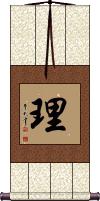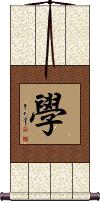Many custom options...
And formats...

Science in Chinese / Japanese...
Buy a Science calligraphy wall scroll here!
Personalize your custom “Science” project by clicking the button next to your favorite “Science” title below...
Science
The rules of life, the universe, and everything.
At its essence, 理 means science.
理 is a very ambiguous and open term; it speaks to the reason that all things exist, and how things work from the microscopic to the cosmic level.
There are many translations for this word, including inner essence; intrinsic order; reason; logic; truth; science; natural science (esp. physics); principle; the underlying principles of the cosmos; the way of things; ruling principle; fundamental law; intrinsicality; universal basis; or essential element(s).
If you are a scientist, or just searching for “the answer to life, the universe, and everything,” this could be the character for you.
Study / Learn / School
學 is “study” or “learn” in Chinese, Japanese Kanji, and old Korean Hanja.
學 is a very broad character that can mean a lot of things related to scholarship. It can refer to a school (in fact, if you put the character for “big” in front of this, you have “college” or “university,” if you put the word for “middle,” you have “middle school.” This can also mean science; the process of acquiring knowledge; learning; scholarship; erudition; knowledge. It can also add the Chinese or Japanese version of “-ology” (the study of) too many words.
![]() There is a very common simplified version of this character. You will see this form in modern Japan and mainland China, Singapore, and other places. If you want this simplified version, please click on the character shown to the right instead of the "select and customize" button above.
There is a very common simplified version of this character. You will see this form in modern Japan and mainland China, Singapore, and other places. If you want this simplified version, please click on the character shown to the right instead of the "select and customize" button above.
These search terms might be related to Science:
Discipline
Discipline / Training / Tempering Character
Knowledge From Experience
Knowledge of Ultimate Truth
Learning Leads to Knowledge, Study Leads to Benevolence, Shame Leads to Courage
Love Your Children, but Discipline Them Too
Military Discipline
Perception of Knowledge
Realization and Knowledge
Self-Discipline / Will-Power
Skill Acquired Through Hard Training
The Sea of Knowledge Has No Limits
We Are Not Born With Knowledge, How Does One Achieve Maturity?
Not the results for Science that you were looking for?
Below are some entries from our dictionary that may match your Science search...
| Characters If shown, 2nd row is Simp. Chinese |
Pronunciation Romanization |
Simple Dictionary Definition |
學 学 see styles |
xué xue2 hsüeh manabu まなぶ |
More info & calligraphy: Study / Learn / School(personal name) Manabu śikṣ; to study, learn, the process of acquiring knowledge; learning. |
慧 see styles |
huì hui4 hui megumi めぐみ |
More info & calligraphy: Wisdom / Intelligence(1) wisdom; enlightenment; (2) (Buddhist term) prajna (one of the three divisions of the noble eightfold path); wisdom; (female given name) Megumi prajñā ; sometimes jñāna. Wisdom, discernment, understanding; the power to discern things and their underlying principles and to decide the doubtful. It is often interchanged with 智, though not correctly, for zhi means knowledge, the science of the phenomenal, while hui refers more generally to principles or morals. It is part of the name of many monks, e.g. 慧可 Huike; 慧思Huisi. |
理 see styles |
lǐ li3 li wataru わたる |
More info & calligraphy: Science(1) reason; principle; logic; (2) {Buddh} (See 事・じ) general principle (as opposed to individual concrete phenomenon); (3) the underlying principles of the cosmos (in neo-Confucianism); (given name) Wataru siddhānta; hetu. Ruling principle, fundamental law, intrinsicality, universal basis, essential element; nidāna, reason; pramāṇa, to arrange, regulate, rule, rectify. |
中醫 中医 see styles |
zhōng yī zhong1 yi1 chung i |
More info & calligraphy: Chinese Traditional MedicineSee: 中医 |
動態 动态 see styles |
dòng tài dong4 tai4 tung t`ai tung tai doutai / dotai どうたい |
More info & calligraphy: Dynamic(See 静態) movement; dynamic state |
規律 规律 see styles |
guī lǜ gui1 lu:4 kuei lü kiritsu きりつ |
More info & calligraphy: Discipline(1) order; observance; discipline; (2) rules; law; regulations order |
奧特曼 奥特曼 see styles |
ào tè màn ao4 te4 man4 ao t`e man ao te man |
More info & calligraphy: Altman |
格 see styles |
gé ge2 ko wataru わたる |
square; frame; rule; (legal) case; style; character; standard; pattern; (grammar) case; (classical) to obstruct; to hinder; (classical) to arrive; to come; (classical) to investigate; to study exhaustively (hist) (See 律令) amendment (to ritsuryō); (given name) Wataru A rule, line, pattern; reach, research, science. |
識 识 see styles |
zhì zhi4 chih tsuguhide つぐひで |
to record; to write a footnote (1) acquaintanceship; (2) {Buddh} vijnana; consciousness; (3) (after a signature) written by ...; (personal name) Tsuguhide vijñāna, "the art of distinguishing, or perceiving, or recognizing, discerning, understanding, comprehending, distinction, intelligence, knowledge, science, learning . . . wisdom." M.W. parijñāna, "perception, thorough knowledge," etc. M.W. It is intp. by 心 the mind, mental discernment, perception, in contrast with the object discerned; also by 了別 understanding and discrimination. There are classifications of 一識 that all things are the one mind, or are metaphysical; 二識 q. v. discriminating the ālaya-vijñāna or primal undivided condition from the mano-vijñāna or that of discrimination; 三識 in the Laṅkāvatāra Sutra, fundamental, manifested and discriminate; 五識 q.v. in the 起信論, i.e. 業, 轉, 現, 知, and 相續識; 六識 the perceptions and discernings of the six organs of sense; also of 8, 9, 10, and 11 識. The most important is the eight of the 起信論, i.e. the perceptions of the six organs of sense, eye, ear, nose, tongue, body (or touch), and mind, together with manas, intp. as 意識 the consciousness of the previous moment, on which the other six depend; the eighth is the ālaya-vijñāna, v. 阿賴耶, in which is contained the seed or stock of all phenomena and which 無沒 loses none, or nothing, is indestructible; a substitute for the seventh is ādāna 'receiving' of the 唯識, which is intp. as 無解 undiscriminated, or indefinite perception; there is a difference of view between the 相 and the 性 schools in regard to the seventh and eight 識; and the latter school add a ninth called the amala, or pure vijñāna, i.e. the non-phenomenal 眞如識. The esoterics add that all phenomena are mental and all things are the one mind, hence the one mind is 無量識 unlimited mind or knowledge, every kind of knowledge, or omniscience. vijñāna is one of the twelve nidānas.; Ālaya-vijñāna and mano-vijñāna; i. e. 阿梨耶 | and 分別事 |; v. 識. |
CS see styles |
shii esu; shiiesu(sk) / shi esu; shiesu(sk) シー・エス; シーエス(sk) |
(1) (See 通信衛星) communications satellite; (2) (See コンテナ船) container ship; (3) (See 顧客満足) customer satisfaction; (4) {med} (See 化学物質過敏症) multiple chemical sensitivity; (5) {baseb} (See クライマックスシリーズ) Climax Series (annual playoff system used by Nippon Professional Baseball); (6) (See コンピュータサイエンス) computer science; CS; (7) {vidg} (from "consumer software") console game |
SF see styles |
esu efu; esuefu(sk) エス・エフ; エスエフ(sk) |
science fiction; sci-fi; SF |
偽学 see styles |
gigaku ぎがく |
false science; science out of line with the world of thought |
兵学 see styles |
heigaku / hegaku へいがく |
military science; strategy; tactics |
兵書 兵书 see styles |
bīng shū bing1 shu1 ping shu heisho / hesho へいしょ |
a book on the art of war book on military science |
内明 see styles |
mitsuaki みつあき |
{Buddh} (See 五明) adhyatma vidya (one of the five sciences of ancient India); science of spirituality; (personal name) Mitsuaki |
冷門 冷门 see styles |
lěng mén leng3 men2 leng men |
a neglected branch (of arts, science, sports etc); fig. a complete unknown who wins a competition |
医学 see styles |
igaku いがく |
medical science; medicine |
医科 see styles |
ika いか |
medical science; medical department |
博物 see styles |
bó wù bo2 wu4 po wu hakubutsu はくぶつ |
natural science (1) (abbreviation) (See 博物学・はくぶつがく) natural history; (2) (orig. meaning) wide learning; broad area of learning |
商学 see styles |
shougaku / shogaku しょうがく |
commercial science |
因明 see styles |
yīn míng yin1 ming2 yin ming inmyou / inmyo いんみょう |
(See 五明) hetuvidya (ancient Indian logic for determining right from wrong, truth from falsehood, etc.) Hetuvidya, 醯都費陀, the science of cause, logical reasoning, logic, with its syllogistic method of the proposition, the reason, the example. The creation of this school of logic is attributed to Akṣapāda, probably a name for the philosopher Gautama (not Śākyamuni). The 因明論 or Hetu-vidyā-śāstra is one of the 五明論 pañcavidya-śāstras, a treatise explaining causality, or the nature of truth and error. |
圖靈 图灵 see styles |
tú líng tu2 ling2 t`u ling tu ling |
Alan Turing (1912-1954), English mathematician, considered as the father of computer science |
地学 see styles |
chigaku ちがく |
(See 地球科学) earth science; geoscience |
大眾 大众 see styles |
dà zhòng da4 zhong4 ta chung |
the masses; the great bulk of the population; popular (of music, science etc) |
学問 see styles |
gakumon がくもん |
(noun/participle) (1) scholarship; study; learning; (2) discipline; branch of learning; (a) science |
学振 see styles |
gakushin がくしん |
(org) Japan Society for the Promotion of Science (abbreviation); JSPS; (o) Japan Society for the Promotion of Science (abbreviation); JSPS |
学術 see styles |
gakujutsu がくじゅつ |
science; learning; scholarship; arts and sciences; academic pursuits |
學術 学术 see styles |
xué shù xue2 shu4 hsüeh shu |
learning; science; academic; CL:個|个[ge4] |
宋慈 see styles |
sòng cí song4 ci2 sung tz`u sung tzu |
Song Ci (1186–1249), author of "Collected Cases of Injustice Rectified" 洗冤集錄|洗冤集录[Xi3 yuan1 Ji2 lu4] (1247), said to be the world's first forensic science text |
実学 see styles |
jitsugaku じつがく |
practical science |
Click here for more Science results from our dictionary
The following table may be helpful for those studying Chinese or Japanese...
| Title | Characters | Romaji (Romanized Japanese) | Various forms of Romanized Chinese | |
| Science | 理 | kotowari | lǐ / li3 / li | |
| Study Learn School | 學 学 | gaku | xué / xue2 / xue | hsüeh |
| In some entries above you will see that characters have different versions above and below a line. In these cases, the characters above the line are Traditional Chinese, while the ones below are Simplified Chinese. | ||||
Successful Chinese Character and Japanese Kanji calligraphy searches within the last few hours...





